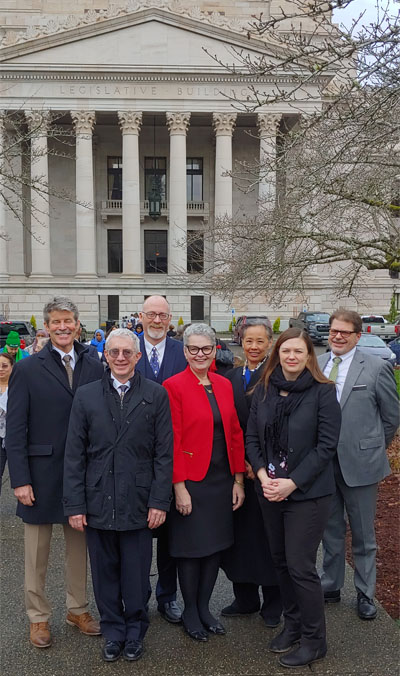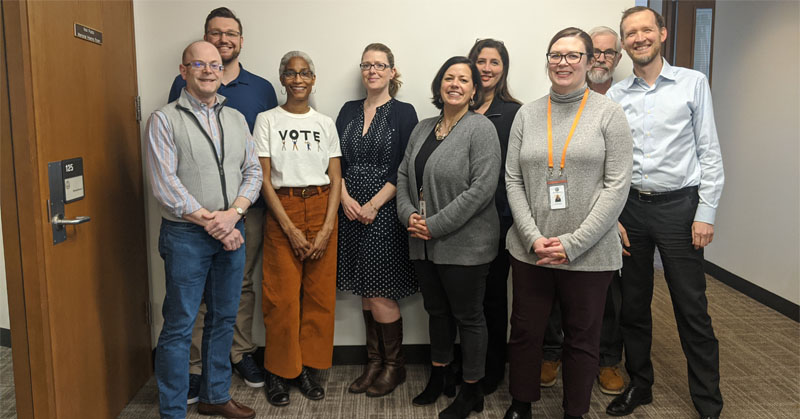STATE GOVERNMENT
Now Administrative Law Judges can advocate for themselves, too
By JUSTINE WINNIE
Special to The Stand
OLYMPIA (May 21, 2020) — The 2020 legislative session brought new hope to a little-known group of unrepresented public service workers: Washington’s Administrative Law Judges (ALJs). After years of attempting to gain the right to bargain over wages and benefits, a passionate group of ALJs joined forces with the Washington Federation of State Employees, AFSCME Council 28 and successfully passed House Bill 2017, granting them the right to collectively bargain.
Worker leaders in the ALJ campaign filed their petition for union recognition with a generous majority of ALJs expressing support for a voice on the job.
A CRUCIAL PUBLIC SERVICE
 Jeff Manson has been serving as an Administrative Law Judge at the Office of Administrative Hearings for ten years.
Jeff Manson has been serving as an Administrative Law Judge at the Office of Administrative Hearings for ten years.
“ALJs are the kind of people who really value public service,” he said.
“Most people who appear in our hearings don’t have lawyers, so our work is an unbiased way to help someone understand the process, so they can fully represent themselves and tell the story they need to tell.”
Like many public employees, ALJs don’t receive much public recognition. But they provide a critical service to Washingtonians: the ability to have a fair, accessible hearing in disputes with public agencies.
ALJs adjudicate many types of cases in Washington, handling disputes in child support cases, disagreements with unemployment assistance, food and cash benefits, and much more. Washingtonians can fairly access this service whether they can afford a lawyer or not.
THE ROAD TO COLLECTIVE BARGAINING
Despite providing an essential service, ALJs had long been “exempt” from civil service, meaning they didn’t share other public employees’ right to join a union.
“I realized several years ago that as exempt employees from civil service, ALJs did not have the right to collectively bargain,” said Manson. “I thought, ‘That statute should be changed.’”
ALJs, dedicated to making the legal process accessible to all Washingtonians, found themselves totally dependent on management’s willingness to offer salary increases. Wage freezes sometimes lasted for years, and ALJs watched as their compensation fell further and further behind not only private sector peers, but other legal professionals working in public service.
“I’m an African-American woman who started out in public defense—I’m very well-aware of the inequities of our system,” said Carolyn Pinkett, an ALJ at the Seattle Office of Administrative Hearings.
“I think what we do as judges is to ensure citizens get to have dignity in their lives. Bringing that perspective to the hearings is important.”
Pinkett has a 26-year history working as an ALJ, and she witnessed an attempt to gain collective bargaining rights for ALJs over a decade ago. That earlier effort fizzled out.
“I’m a big believer in unions,” Pinkett said. “My mother was in an education union. It was part of my history as a person: a belief in the power of the worker.”
Then, in 2019, fellow ALJ Jeff Manson heard about another group of exempt-status public employees: the assistant attorneys general.
Like the ALJs, AAGs in Washington provide a crucial public service, but low pay and the absence of a salary structure contributed to issues with retention and turnover among the AAGs. They were fighting for the right to join a union. That sounded familiar to Manson.
Though the legislative session was already in full swing, he reached out to WFSE, the union supporting the AAGs in their bid for collective bargaining, in hopes it would be possible to build on the momentum the AAGs had created.
Ultimately, the ALJs’ first bill did not pass. But the following legislative session, they were prepared—and WFSE had their back.
THE POWER OF COLLECTIVE ACTION
Several ALJ organizers recalled a hearing in the Senate & Labor Committee earlier this year. It was a WFSE lobby day, and the Capitol was flooded with dedicated members in green shirts. That day, three ALJs signed in to testify in support of their bill to gain collective bargaining rights.
One was Karl Boettner, an ALJ who has worked in the Spokane Field Office for the past ten years.
“At the end of the committee hearing, the Chair announced that there were 18 people signed on in favor of the legislation,” said Boettner. “There were only three ALJs there. Fifteen WFSE members just came and were interested and observing.”
Boettner realized the tides were turning in the ALJs’ favor.
“You’re not on your own,” he said. “[Other WFSE members] get it, and they were supportive and encouraging us. Everyone in the committee room knew that.”
Pinkett felt the union difference, too.
“I felt, especially when I was in Olympia seeing how the sausage was made, that this is the union we want,” she said.
Together, WFSE and the ALJs passed House Bill 2017.
“I see the power of collective action,” said Manson. “We’re joining with others, who have joined with others. We’re not alone in this.”
“We’re not just a few people in a small agency that most people haven’t heard of. We’re able to stand shoulder to shoulder with other public service providers.”
ALJs hit the ground running once the bill passed, getting union authorization cards signed, meeting coworkers, and hearing the issues they were facing at work.
In order for Washington state employees to join or form a union, a majority of their workplace must first sign union authorization cards. Those cards are then submitted to and reviewed by the Public Employment Relations Commission.
“Because we’d been in constant contact with other ALJs about the legislative effort, people were ready to sign as soon as the cards were available,” said Manson.
Within just a few weeks, the newly united ALJs had gotten significantly more than half of their co-workers to sign union authorization cards.
LOOKING TO THE FUTURE
As the ALJs elect their bargaining team and prepare to negotiate their first contract, they’re excited to turn over a new leaf at their agency.
“I hope to see a level of trust between management and judges restored,” said Pinkett.
“I hope to see some consistency and fairness in treatment of ALJs across the state, and I would like to see people who didn’t have a voice feel they can speak up. A union is made up of people. Look around your office. These are the people in your union. If you have a card, you’ll have a voice in that!”
Manson sees the opportunity to have a voice, too.
“This is an opportunity to communicate and come to agreement as equals with management,” he said. “We can stand with our colleagues and speak with an equal voice to.”
He’s looking forward to using the ALJ’s newfound power to make the Office of Administrative Hearings an agency that retains judges while providing Washingtonians with fair, accessible legal processes.
“We’re joining a union,” Manson said. “We’ll have our own bargaining unit, but we’re still part of a larger organization that’s advocating on behalf of everybody. And the more numbers we have, the more different perspectives will be included, the more leverage we have.”
This article was written by Justine Winnie of the Washington Federation of State Employees (WFSE), AFSCME Council 28.






